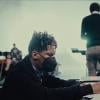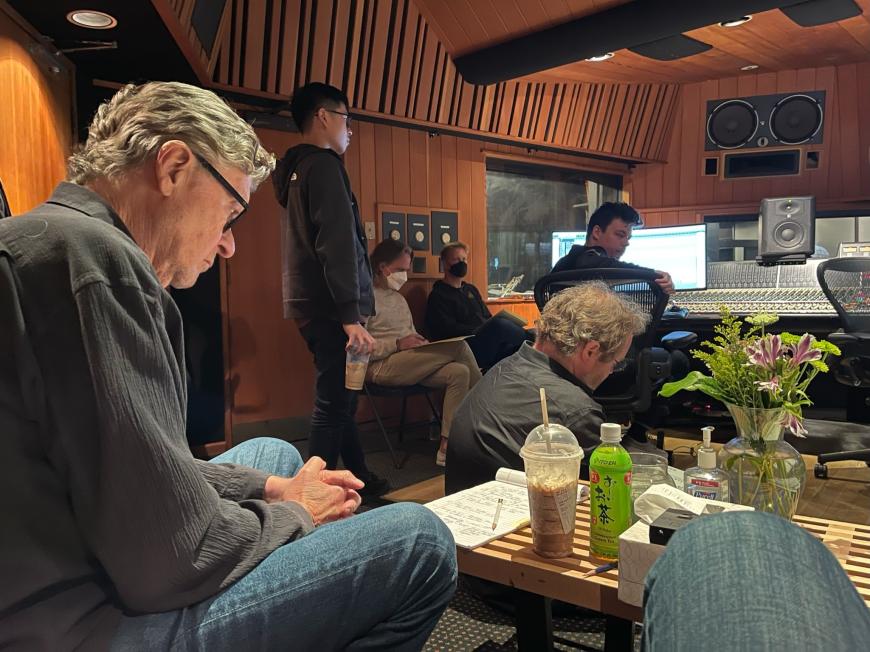
Robbie Robertson had never done anything like this before.
The onetime frontman for The Band, the folk-rock group that took the hippie generation back in time to a mythic American past, Robertson had been working in film ever since he met Martin Scorsese while making The Last Waltz, the concert film touchstone released in 1978. The two became friends, and from there Robertson supervised many of Scorsese’s film soundtracks, occasionally contributing an original song or instrumental piece. He came the closest to proper film scoring with The Irishman, the 2019 epic which featured a handful of his harmonica-blues cues in between Scorsese’s typical jukebox soundtrack.
But then Scorsese asked Robertson to score his next film entirely. It was an unprecedented ask for Robertson, who could neither read nor write music, but the canvas of Killers of the Flower Moon was invitingly vast and rich, and the subject of the Osage people hit close to home; he was a descendant of the Mohawks on his mother’s side. So, with the help of orchestrator Mark Graham, a Hollywood heavyweight who regularly works with John Williams, Robertson set to work creating an atypical score in a most unconventional way.
It was in the thick of the pandemic, the summer of 2021, when Robertson came up with a dozen earthy grooves and jams. (Scorsese asked for a custom “jukebox” of musical cues that could be used in the edit, rather than having Robertson write cues to picture.) Robertson had a sonic vision of a totally unique ensemble, and he summoned eight guitar players (what he called a “swarm”) to his adopted studio home at The Village in west L.A. and had them sit in a semicircle, like a string section. They were joined by keyboards, bass, percussion, a few cellos, and harmonica.
“It was so outside the box of what Robbie was used to, thinking like an arranger,” says Buck Sanders, a film composer himself who brought a harmonic slide guitar of his own invention to the swarm. “Trying to wrangle in eight guitar players is really difficult, trying to match a tone. He wanted it to sound semi-period, no modern sounds.”
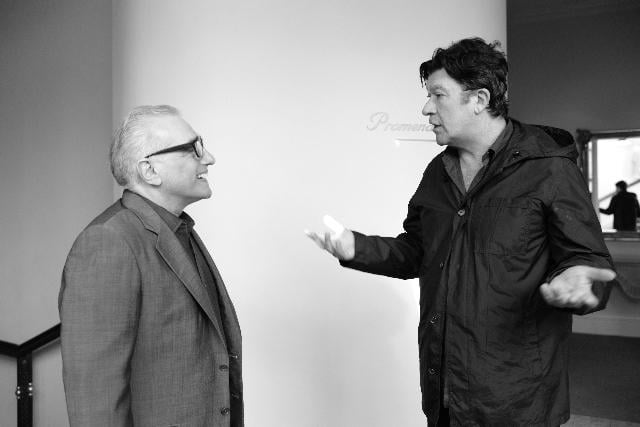
Robertson, nearing 80 and quietly grappling with cancer, mostly stayed in the booth as this strange orchestra took down his charts, arranged by Graham, over the course of a few days. The mood “was pretty lighthearted,” says Sanders, “even though I think he wasn’t ever particularly excited about what he was hearing.” Robertson “was challenging,” says Graham, “because he would say, ‘Eh, that’s shit.’” He explicitly wanted nothing “ordinary,” and nothing stereotypically “Indian.”
Robertson ultimately abandoned most of the recordings from that ensemble and instead relied on a much simpler, pared-down approach highlighting Fender Rhodes guitar, upright bass, and harmonica — with a powerful dash of Indigenous drums and flutes. The score was part rock, part blues, part Osage heartbeat, and Scorsese pumped it all throughout his 3 ½-hour film, with the volume often cranked way up. It was the richest and most impactful score of Robertson’s career, and he was poised for the kind of critical plaudits and awards attention that likely would have flung other doors wide open.
He completed the score and threw an album listening party with his collaborators and family. Killers of the Flower Moon premiered at Cannes in May. I screened the film in July and was scheduled to interview Robertson for a big Los Angeles Times profile two weeks later. But on Aug. 9, 2023, Robertson suddenly, unexpectedly died.
What might have been his great transition became his last testament. Robertson’s peers in the music branch of the Motion Picture Academy honored the score with a posthumous Oscar nomination — his first — for the awards that will be handed out March 10.
But this is not the first time a deceased composer has received the industry’s highest commendation. In fact, in a strangely poetic echo, the last composer to receive a nomination after his or her death was on another Martin Scorsese picture.
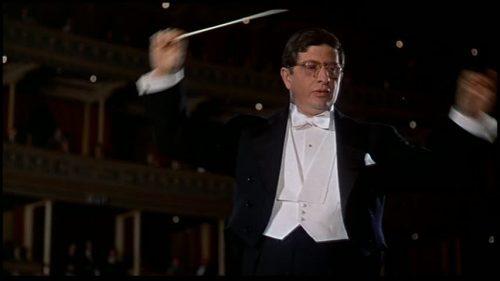
Bernard Herrmann, the iconoclast who reinvented the art of film scoring with masterpieces ranging from Citizen Kane to Vertigo, spent two days recording his lonely, spiraling saxophone score for Taxi Driver. The sessions were tense: Herrmann was famously hard to get along with — his intractable attitude was partially responsible for the breakup of his creative marriage to Alfred Hitchcock — and when Scorsese, a 32-year-old superfan, first called him in London to see if he would score the young director’s new film, Herrmann said: “I don’t do movies about taxi drivers!” and hung up. Scorsese had to fly to England to persuade the 64-year-old legend otherwise, and even still, when Herrmann landed at LAX, he went straight to the British Overseas Airways Corporation counter to see if he could go straight back home.
Needless to say, “we were nervous about him,” producer Michael Phillips says. Herrmann conducted an elite band of L.A. session players at Burbank Studios, and every now and then he would knock the gooseneck lamp on the stand with his baton. At one point “he just stormed off the stage,” says Philips, “he was so angry with the lamp. So we were really walking on eggshells around him.” The sessions were otherwise pretty smooth — old friends and new admirers, including Steven Spielberg, came by to visit the icon — and Scorsese was instantly in love with the music. “We were all a little bit in awe of him and afraid of him,” says Phillips, “but he came and he delivered.”
It was Christmas Eve 1975, and when Herrmann went back to his hotel that night he died in his sleep of congestive heart failure. Scorsese dedicated Taxi Driver to Herrmann, and the composer received not one but two Oscar nominations in the wake of his death — the other was for Obsession, Brian De Palma’s blatant homage to Vertigo. Both Herrmann scores lost to Jerry Goldsmith’s satanic score for The Omen.
An old friend and colleague of Herrmann’s was Alfred Newman, a lion who helped write the rules for Hollywood film scoring — they actually co-scored the 1954 epic The Egyptian in a rare titanic team-up. Newman’s heyday of scoring religious dramas (The Song of Bernadette) and showbiz satires (All About Eve) and of running the music department at 20th Century Fox was well over by the time he was asked to score Airport, the first of many disaster movies to emerge in the 1970s. At 69, Newman had just been through a bruising experience on The Greatest Story Ever Told, where after months of scoring and re-scoring the picture, a lot of his best music was replaced by an insecure director, George Stevens, with classical selections. Emotionally beaten down, Newman was also in bad health from years of heavy smoking, and he needed additional support from other composers to finish work on Airport.
The score was at once a little old-fashioned — like his showy CinemaScope Westerns — awkwardly contemporary, and also an anticipation of the resurgence of huge, melodic orchestral scores that John Williams would compose for the biggest disaster films and blockbusters of the ’70s. Newman finished recording his new score but was too sick with emphysema to attend the final mix. He died on Feb. 17, 1970, leaving behind an astounding body of work, several famous proteges, and a royal family line of film composers — including nephew Randy Newman (The Natural) and youngest son Thomas Newman (The Shawshank Redemption).
Alfred Newman’s posthumous Oscar nomination was his 45th, a staggering record and likely as much a lifetime kudos from his fellow composers as recognition for what is a now-forgotten score. (He lost to the much hipper Love Story score by Francis Lai.)
Before Newman, the last composer to earn a posthumous Oscar nomination was Jerome Kern, the renowned American songwriter and theater composer who wrote a book of original numbers for the 1944 movie musical Can’t Help Singing, starring Deanna Durbin. Technically, Hans J. Salter scored the film, although he relied on Kern’s melodies, and they shared an Academy nomination — and lost to Anchors Aweigh by Georgie Stoll.
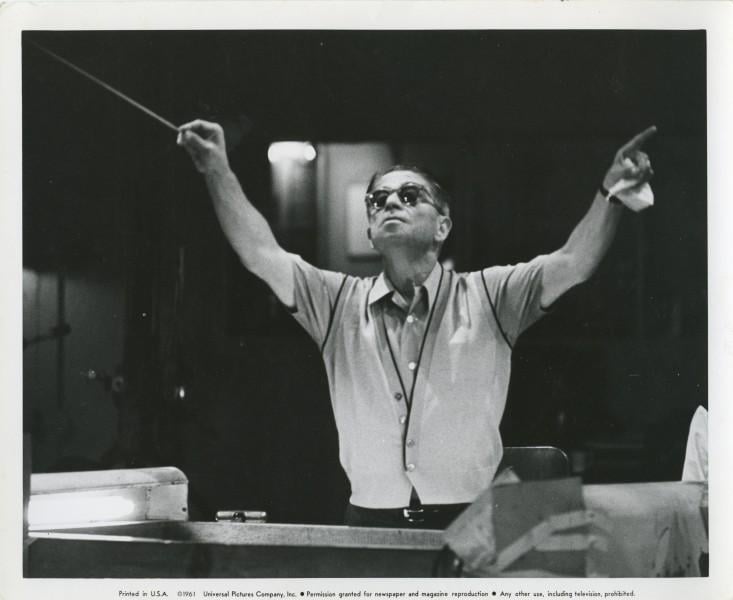
Kern was 60 when he died of a cerebral hemorrhage, and his obituaries lauded him as “the envy of his fellow craftsmen.” He had a major influence on contemporary composers such as Irving Berlin, Cole Porter, and Richard Rodgers — as well as John Williams, who credits a lot of his tuneful sensibility to Kern.
The first and perhaps most heartbreaking entry in this peculiar club was Frank Churchill — a pianist from Maine who shaped the Disney songbook with indelible contributions like “Who’s Afraid of the Big Bad Wolf?” “Heigh-Ho” from Snow White and the Seven Dwarves, “Baby Mine” from Dumbo, and many others. Churchill completed work on the music for Bambi, which included the ballad “Love Is a Song” and the lullaby “Little April Shower,” woven into a pastoral orchestral score — and then, at the age of 40, ended his own life with a shotgun at his piano.
“My nerves have completely left me,” he wrote in a suicide note addressed to his wife. “Please forgive me for this awful act. It seems the only way I can cure myself.”
The only posthumous composer who won an Oscar was Victor Young, in 1957, for the comedy epic, Around the World in 80 Days. (At 3 hours and 22 minutes, it was just as long as the very long Killers of the Flower Moon.) It was bittersweet vindication for a perpetual bridesmaid at the Oscars; Young, who died from a cerebral hemorrhage at the age of 57, had been nominated for 22 Oscars since his prolific career began in the 1930s; this was his first, and only, triumph.
None of the other composers in this small, tragic society won their posthumous Oscar. Most of them were at the end of their careers, one still in his prime. At 80, Robertson was the oldest of them all — yet his Killers of the Flower Moon score was a loud declaration that his film scoring career was full of promise.



